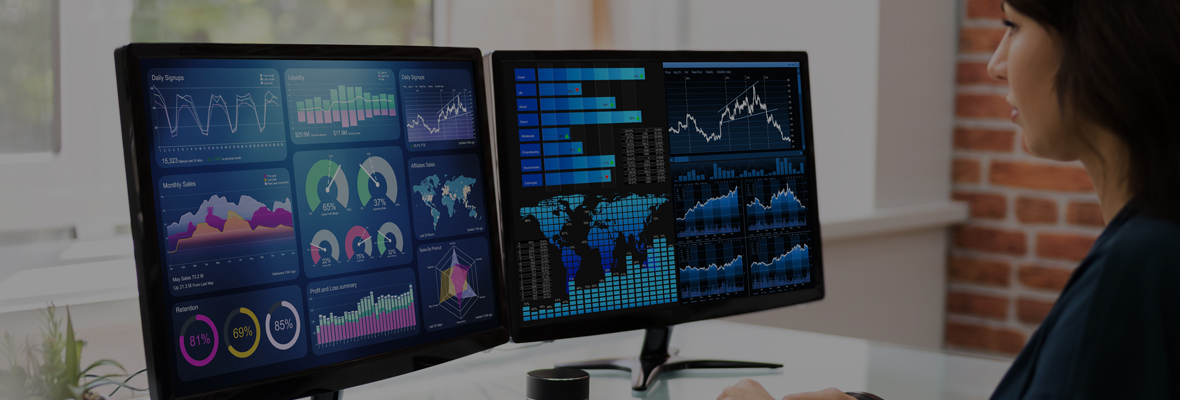What Skills Does a Data Analyst Need?
Written by Melinda Irvine
25th November 2022
Data analysis is one of the most rapidly expanding career paths in the world as ‘big data’ increasingly drives business decisions in marketing, operations, product development, logistics, HR, compliance and corporate governance. Big data is so complex that it needs to be collected, cleaned and analysed by professionals known as data analysts — before being presented to decision-makers in a way that’s accurate, relevant and understandable. Does this sound like the perfect career for you? In today’s blog we’ll be taking a brief look at the skills required for a data analyst as well the qualifications you’ll need to get a job.
Technical Skills
Effective data analysts have specialist technical skills and a working knowledge of ICT including operating systems, platform technologies, networking, security, database technologies and programming. The following are critically important:
Programming — data analysts need to be able to code in multiple languages - as a minimum you should know SQL, R, Python and MATLAB.
Advanced Mathematics — if you love math, you are in the right place. Data analysts apply linear algebra and calculus to drive machine learning and deep learning applications.
Data Visualisation — to be an effective data analyst, you’ll need the creativity and problem-solving skills to turn raw data into useable information that drives decision making and organisational change. Most people don’t have the capabilities to read data in its raw format, so you’ll need the skills to transform your data findings into visual reports, charts, infographics and illustrations.
Data Cleaning — data analysts devote a great deal of time and energy cleaning data to ensure its accuracy, integrity and reliability. You’ll need the skills and focus to develop algorithms and code that removes corrupted data and duplicate records. You’ll also be formulating ways to deal with missing fields and data.
Personal Attributes
The data analysis career path has fantastic prospects for employment, but not everyone is suited to this job role. To really succeed you’ll need:
Curiosity — analysts are naturally curious and are a bit like data detectives. Are you already asking questions like: is the source reliable? Do customers really behave like that? What would the CEO do with this information? Are there enough variables?
Introversion — if you love being the centre of attention at meetings and get your energy from the external world, you should probably skip the data analytics career path. But introverts, who don’t mind working alone and spending time in deep reflection, will definitely thrive in this job role.
Confidence — do you have the confidence to formulate decision models and present your findings to CFOs, CEOs and other stakeholders? What if they have questions? Can you articulate your ideas and back up your recommendations with conviction?
Future-orientated — do you live in the now but have a sharp eye on what’s ahead? Successful data analysts are able to harness the latest hardware, algorithms and software applications while incorporating emerging technologies. To really be ahead of the game though, you might be developing your own.
Qualifications
Does data analytics sound like the career path for you? Here’s a few pathways into your dream job.
Graduate Certificate in Data Science – if you’re already degree qualified in an unrelated field, you can quickly again a working knowledge of big data, learn to use the latest data analytics technologies, and gain the skills you need to articulate your findings to the organisation’s decision makers.
Graduate Diploma of Data Science – level-up your career by learning how to harness the power of big data for organisational decision-making. With this post-graduate diploma you’ll gain high-end skills in data modelling and programming, and graduate ready for your Masters.
Bachelor of Data Analytics — gain an in-depth understanding of big data applications while learning how to capture and analyse data using web systems, smart technologies, robotics, IoT, AI and deep learning applications. You’ll also gain the skills you need to formulate sound decision models and communicate your findings.
Bachelor of Data Science and Decisions — this degree is highly technical and very focused on mathematical functions, data structures, algorithms and statistics. You’ll learn how to apply maths and computational techniques to real-world problems, then generate and interpret complex data sets.
Master of Applied Analytics — gain an understanding of the capabilities (and limitations) of analytics technologies. You’ll also be learning how to improve the relevance of collected data by applying it to real-world problems in health, urban planning, education, psychology and more.







